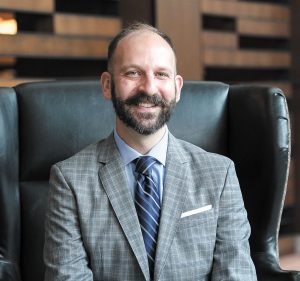Subscriber Benefit
As a subscriber you can listen to articles at work, in the car, or while you work out. Subscribe Now
Faegre Drinker Biddle & Reath LLP
Harvard Law School, 2010
Why did you decide to enter the legal profession?
I took a few legal classes in undergrad and it just matched the way my brain works. It felt natural. It also seemed like a useful degree, both for a career but also to help people.
What does “diversity, equity and inclusion” mean to you?
I’m not good with BIG questions like this, but I guess to me this is all about rebalancing the scales of structural forces that have benefited a certain few for far too long. We have a long way to go, but our work in DEI is often just about making things a little fairer than they used to be.
How did you get involved in DEI work, and why have you stuck with it?
Well, first and foremost, it has always been something I just find important to do. It’s just a natural thing to be invested in. But also, candidly, as a Latino man who presents as a white man, I appreciate that, (a) I don’t face many of the same hurdles other diverse lawyers do, and, (b) I can use that to my advantage. For some people, hearing about why DEI is important from someone who looks like them makes it feel like less of an attack and might make them more likely to engage.
What would you say to someone who perceives “DEI” as a business “buzzword”?
I’m actually not sure that I find that worth fighting, at least not on a regular basis. I might note that our clients value it, that diversity of backgrounds and opinions leads to better results, etc. But instead of spending time and effort convincing someone otherwise, I would rather just put in the work with people who do care and hopefully show the others that it’s worth caring about by getting results.
What is the most significant change you’ve seen in the legal profession since you began your career?
The impact of 24/7 availability. Having access to email on smartphones existed before I started, but not for that long. And it seems that everyone adjusted their expectations to the idea that people should be able to read and respond to emails at all times, but I’m not sure people have really internalized what that does to us and the profession. Everyone who trained me had a wildly different start to their career and got used to the current approach over time. These days you just dive right into the constant flow of emails from day one.
What’s the best advice you’ve ever received?
Write shorter emails.
How do you spend your free time?
Mostly with my wife and kids.
What was your favorite — and least favorite — class in law school?
Both are professor-based. My favorite classes were Criminal Procedure classes taught by Ron Sullivan — he was amazing. My least favorite class was Property because the professor (who I’ll leave unnamed) didn’t like how I took notes, hammered me all year, and more or less punished me by assigning me the longest case of the semester to summarize in class. Never mind that the guy next to me never did his homework and would forget to bring a book to class. Yes, I’m still bitter.
Tell us about your work incorporating DEI into recruiting efforts.
As the hiring partner for our Indianapolis office, I have consistently worked on using our recruiting to advance the firm’s DEI efforts more generally. It’s not just about recruiting diverse candidates, but about recruiting law students who value DEI and will advance our work when they join the firm. And at times, it’s about pushing back on some of the historical structures that tend to hurt diverse candidates (e.g., referrals from colleagues and other lawyers in Indy tend to benefit certain kinds of candidates over others).
We’re told that you do a lot of work with DACA recipients in your pro bono practice. What drew you to that work, and what’s the value of having a Spanish-speaking attorney in those cases?
In my first couple years of practice, I did a variety of pro bono work. But it often felt like a bad use of time jumping around and having to learn the process every time I tried something new. And as a corporate lawyer, litigation-based pro bono never made sense. So, after a few years, I started doing DACA renewals and citizenship applications as my main pro bono work. Mostly it was just so I could learn how to do something well and repeat it for other clients. But also, I am myself an immigrant and often have a lot in common with these clients. “There but for the grace of God,” and all that.
Please enable JavaScript to view this content.
